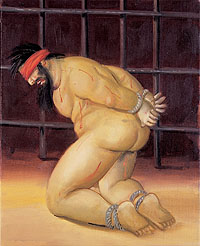UC Berkeley Press Release
Botero exhibit joined by talk with artist, panels on violence, art, human rights
BERKELEY – A University of California, Berkeley, exhibit of Colombian artist Fernando Botero's depictions of Abu Ghraib prison abuses is stimulating a series of public conversations on campus on related issues such as art and violence, torture, human rights and terrorism.
 Abu Ghraib painting by Fernando Botero |
The Botero exhibit, sponsored by UC Berkeley's Center for Latin American Studies with the support of UC Berkeley's School of Law (Boalt Hall) and the University Library, opens at 6 p.m. Monday, Jan. 29, in Room 190 of Doe Library and closes March 23. It and all related programs are free and open to the public. Funds for the events have been privately raised.
So far, three programs have been scheduled and more are expected:
- "A Conversation with the Artist." Botero will converse with Robert Hass, United States poet laureate from 1995-1997 and a UC Berkeley English professor, at 4 p.m., Monday, Jan. 29, in Chevron Auditorium at International House, 2299 Piedmont Ave., near Bancroft Way.
- A panel discussion on "Art and Violence" will feature Timothy J. Clark, a UC Berkeley art history professor and renowned authority on modern art; Tom Laqueur, a UC Berkeley history professor; and Francine Masiello, a UC Berkeley professor of Spanish and Portuguese and a scholar of Latin American culture. It will take place at 4 p.m., Wednesday, Jan. 31, in the Morrison Library, inside Doe Library and directly west of the Botero exhibit.
- "Torture, Human Rights and Terrorism" will be explored by a panel including Aryeh Neier, president of George Soros' Open Society Institute, an adjunct professor of law at New York University and founder of Human Rights Watch; Jose Zalaquett, president of the Inter-American Commission on Human Rights, law professor, co-director of the Human Rights Center at the University of Chile's Law School and a writer about the arts in Latin America; Jenny S. Martinez, an associate professor of law at Stanford University who defended alleged dirty bomb suspect Jose Padilla in arguments before the U.S. Supreme Court in 2004; and Philip Zimbardo, former president of the American Psychological Association, the professor emeritus of psychology at Stanford who conducted a famed experiment pitting students posing as guards against those posing as prisoners, and author of a book on Abu Ghraib due out in March. The panel will meet at 4 p.m., Wednesday, March 7, in Booth Auditorium at Boalt Hall, which is on Bancroft Way between College and Piedmont avenues.
Harley Shaiken, chair of the Center for Latin American Studies, said Botero's art provides a critical Latin American perspective on the role of art in a time of conflict.
Shaiken said that last fall, he read a positive review of a brief showing of the Abu Ghraib materials at New York City's Marlborough Gallery, which represents Botero, and also became aware that museums across the country had been approached about hosting the exhibit, but had declined the offer.
"We felt that great art is often provocative, but the hallmark of a democratic society," Shaiken said. "Mr. Botero was very positive about bringing this exhibit to Berkeley from the moment we spoke to him."
While the Abu Ghraib paintings are disturbing, Shaiken said, they also are powerful works of art and commentary that should be displayed and freely discussed.
"And what better place to host the exhibit than UC Berkeley, a great research university with ideals of openness?" he said, noting the campus is home to the Free Speech Movement.
Peter Selz, a UC Berkeley emeritus professor of art history, founding director of UC Berkeley's Art Museum and a noted authority on art and politics, saw the Abu Ghraib art in New York. He called it "extremely important" and said he is delighted it will be displayed on campus.
Botero is considered the most highly-regarded contemporary artist from Latin America. He lives in Europe, where he has exhibited his Abu Ghraib art in numerous museums. His paintings and sculptures are housed in 46 museums around the world, including the Metropolitan Museum of Art in New York. Two recent paintings he sold went for $2 million each.
Botero has said the Abu Ghraib work is not for sale and that he hopes to eventually donate it.
Continue to check the Center for Latin American Studies' Web site for the latest information about events related to the exhibit.

